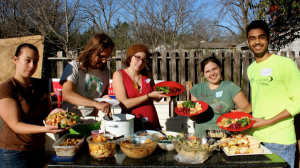Fighting food waste together is a community led approach to tackling a global issue. Food waste has become a massive problem not just for households but also for businesses. According to research, it is estimated that once food is wasted, it costs the global economy $1 trillion every year. Globally, around one-third of all food produced ends up being wasted. This is despite the fact that there are millions of people starving worldwide. But, with community initiatives, we can fight food waste together. Here are some of the ways that communities are coming forward to battle waste.
Food sharing programs
Food sharing programs are helping to reduce food waste by connecting food donations with people who need it the most. Such programs are non-profit and rely on the public to donate food, which is redistributed to community groups, shelters, and individuals in need. Various initiatives are running effectively across the world, like “2Good2Go” and “Foodcloud.” Through mobile apps and social media platforms, these organisations manage to inform donors and those in need when, where, and what food items are available.
Food recovery programs
Many supermarkets, retailers, and restaurants engage in food recovery programs to make sure that food is not going to waste. These programs include collecting and donating surplus food to food banks and charities. In this way, businesses can donate their excess food to charities and people in need rather than let food go to waste. Such programs play a significant role in addressing waste issues and can make a big difference with the help of local communities.
Green Composting
In cities, green composting bins are becoming increasingly popular, allowing households, restaurants, and businesses to compost food waste and turn it into fertilizer. Food waste composting is an excellent way to turn food waste into a useful resource rather than just sending it to a landfill. Green composting initiatives also encourage community involvement and promote sustainable living practices; all while reducing the amount of waste that ends up in landfills.
Educational initiatives
The best way to avoid food waste is to reduce the amount of wasted food in the first place. Many community initiatives focus on education and raising awareness among people about food waste and its harmful effects. Such initiatives inform people about the benefits of reducing food waste and encourage them to practice more sustainable habits like meal planning, preserving food, and using all parts of produce. Some communities even organize cooking classes and workshops that educate people on creative ways they can use food leftovers.
Community garden initiatives
Community gardening is a great way to engage people and promote sustainability. Not only does it serve as a source of fresh, homegrown produce, but it also reduces food waste. Community gardening initiatives are a great way to bring people together and encourage participation in the local community. These initiatives help to build stronger relationships across the community, encourage people to grow their own vegetables, and provide greater access to affordable, fresh produce.
Conclusion
Communities worldwide can make a significant impact on food waste through their collective efforts to reduce waste. Although each initiative may seem small, their combined effect can make a big difference. By implementing strategies like food sharing, food recovery, green composting, educational initiatives, and community gardening, we can reduce the amount of food waste and help feed those in need. By working together, we can make a positive impact on our environment, on our communities, and on ourselves.

#AreYouWithUs #GreyhoundRecycling #GuaranteedIrish #BinCollectionDublin #SkipHireDublin





